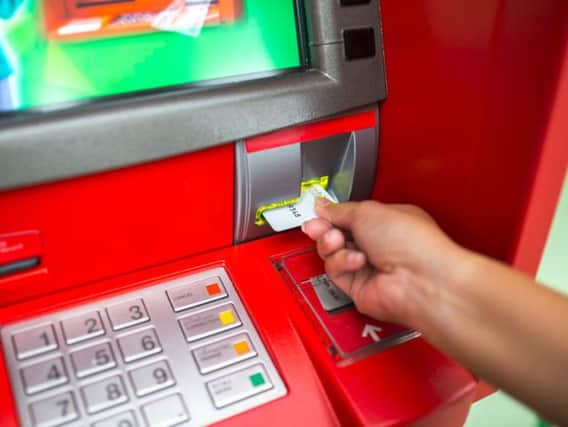Cash machine fees could be on the way after bank ATM dispute


Link, which runs Britain's cash machine network, confirmed that it might charge some of its fee-free ATM machines to ones that charge customers money to withdraw money.
The network of 70,0000 machines is currently maintained by banks, building societies and other members of the network, but some want to cut their contributions.
Advertisement
Hide AdAdvertisement
Hide AdThe members of the network are due to meet next Thursday to try reach an agreement, but should they fail to do so, it could lead to the introduction of charges or ATMs becoming accessible only to customers of a particular bank.
A spokesman for Link confirmed its commercial model is under review but stressed that changes “would not happen overnight”.
He said: “We operate in a competitive market and there are other ATM networks in the UK available for card issuers and ATM operators if our model becomes unattractive. We are working hard to avoid this situation.”
At present, 23 per cent of the UK's 700,000 cash machines charge, while the rest are free to use.
Advertisement
Hide AdAdvertisement
Hide AdBut Peter McNamara, the Chief Executive of Note Machine, a member of Link, said that consumers could face being charged at many more of them.
"If the proposals that are being put forward by Link went ahead, we estimate that you could be losing up to a quarter of the free-to-use ATM sites in the UK," he told BBC Radio Five Live.
At the centre of the dispute are the so-called interchange fees. When the customer of one bank uses an ATM operated by another, a payment of around 25p is made from the cardholder’s bank to the other – regardless of the ATM’s location.
It's thought that banks with a large number of card-holders feel they are being unfairly penalised.
Advertisement
Hide AdAdvertisement
Hide Ad"Some of the very big banks have a lot of cardholders who do a lot of transactions, and they feel that perhaps their share of what they are putting in the pot that pays for ATMs is disproportionate and potentially too high," said Mr McNamara.
"They may go outside the Link mechanism to find a cheaper way of making those machines run, which is the risk in the system that could develop."
Link said the discussions could take several months.
What is Link?
Link is the UK’s cash machine network. It is connected to almost every cash machine in the UK and processes up to one million transactions per hour.
All of the UK’s main card issuers are members of Link, allowing their customers to withdraw cash from any Link ATM.
Advertisement
Hide AdAdvertisement
Hide AdThey pay into the scheme based on a formula which takes into account the number of card-holding customers and their transactions.
All the main cash machine operators – banks, building societies, and shops – are also members of the Link network. They receive a fee for the upkeep of each machine.
The network currently runs more than 70,000 ATMs across the country. Of these, 52,000 are free to use, and around 18,000 charge.
How are costs calculated?
Where the customer of one bank uses an ATM operated by another, a payment of around 25p is made from the cardholder’s bank to the other – regardless of the ATM’s location.
Advertisement
Hide AdAdvertisement
Hide AdThe amount each of Link’s 39 members pay is determined by a formula that takes into account the number of cardholding customers and how many transactions they make.
Some members say that the amount of money they pay is disproportionate to others, especially if they have a large numbers of cardholders relative to the number of ATMs they operate.
They argue that their rivals are charging them excessive fees and ignoring the different running costs of each ATM.